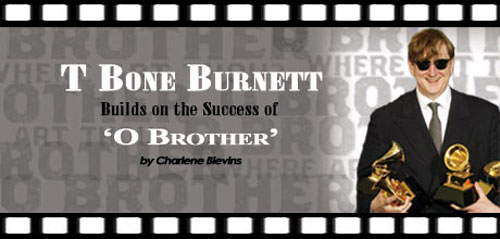T Bone Burnett Builds on the Success of ‘O Brother’

It’s a story we all love: A quietly successful artist/songwriter/producer/guitarist becomes an “overnight” star by producing an album of traditional American music for a quirky, comic, moderately successful film. The record, however, sells six million copies with virtually no commercial radio airplay, wins six Grammys, that many more bluegrass and country awards, and lodges itself at the top of the Billboard country charts for over 80 weeks — so far. By all accounts, the man and the music set the struggling music industry on its ear.
The record, of course, is the soundtrack to the Coen Brothers’ O Brother, Where Art Thou, and the man, T-Bone Burnett.
Even if country biz executives are scratching their heads and calling it a fluke, six million people find the music worth paying for, which indicates something much more substantial. Burnett laughs a gentle laugh at the nay-sayers and you know it makes perfect sense to him.
“Music is a collectible thing, and it’s important to have the actual piece if it’s something people care about. The problem with music these days has to be looked at more in the area of the kind of music being made rather than in the way it’s being broadcast or disseminated. If musicians make great music, people go get it.”
Joseph Henry Burnett, born in St. Louis and reared in Ft. Worth, has been making great music for 30-some years. He cut his musical teeth on Texas blues and after high school opened a recording studio. By 1975, he’d already become a producer of note and had the guitar chops to be invited along on Bob Dylan’s Rolling Thunder Revue tour. A couple of rock bands later, Burnett released his first solo album, the acclaimed Truth Decay, in 1980.
Despite a heavy studio schedule throughout the ’80s and ’90s producing some 40-plus records for such diverse artists as Bruce Cockburn, Counting Crows, Los Lobos, Jackson Browne, Natalie Merchant, Tony Bennett, Elvis Costello and the Wallflowers, Burnett released several more solo projects, including 1992’s heralded Criminal Under My Own Hat.
Recent projects include the soundtracks for The Divine Secrets of the Ya Ya Sisterhood, which was the first release on Burnett’s very own label, DMZ Records, and for Cold Mountain, out next year. For several years Burnett has been writing music for theatre, including the Sam Shepard plays Tooth of Crime and The Late Henry Moss. The music for these will become his next solo record, slated for release in 2003.
Where will he find the time? This Grammy Producer of the Year swears he’s not going to produce any more records but will concentrate on his solo project and on building DMZ, where he hopes to “create an environment where musicians are encouraged and supported; where they are free to . . . soar.” Burnett says he looks for “non-genre-specific” artists. “I’m only interested in records that don’t fit anywhere. Like O Brother didn’t fit anywhere.”
What makes things fit for T-Bone Burnett, it seems, is his belief that the song is the center of it all. He considers himself, above all, a songwriter and says his work for film and theatre has changed the way he writes. “Every one of the arts is story telling, you know,” he says. “Writing for plays is very liberating because you’re writing for a character. It’s been an experience learning to write in different voices, learning to say things I might not have been able to say — or wouldn’t have let myself say — when I was more constricted as a character and maybe more self-conscious about who I was.”






Community
Connect with BMI & Professional Songwriters